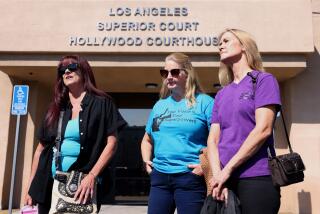Man Sentenced for Having Sex Parties at L.A. Home : Laws: Officials say ruling supports use of zoning ordinances against adult businesses in residential areas. ‘Swingers’ ’ host is ordered to work at AIDS hospice.
- Share via
A Los Angeles man who transformed his home into a self-proclaimed “sexual Disneyland” for paying “swingers” was sentenced Monday to community service at an AIDS hospice, in the city’s first successful effort to enforce a law banning adult entertainment businesses in residential areas.
Thomas Kilfoyle, 48, had been found guilty on Friday by a Los Angeles Municipal Court jury after just five minutes of deliberation. It was the first time that what is essentially a zoning law had been tested by a jury.
Two other people charged in the sex parties case avoided a trial by pleading guilty and paying $50 fines.
Deputy City Atty. Michael Guarino said the guilty verdict was significant, especially considering that jurors tend to be reluctant to convict under more traditional pornography laws. The conviction clears the way to rid residential neighborhoods of dozens, perhaps hundreds, of nearby adult establishments, Guarino said.
“The important thing about all of this, as witnessed by the five-minute guilty verdict, is that we have finally struck the proper balance between making sexual materials and conduct available while protecting the quality of residential life,” Guarino said.
Kilfoyle, in his defense, contended that he was conducting private parties for consenting adults. In an interview after his sentencing, he said the gatherings were “like the adult equivalent of a Tupperware party. . . . I have done nothing to be ashamed of.”
Kilfoyle said he had “transformed that house into a sexual Disneyland,” attorneys on both sides said.
Guarino said police estimated that the parties were a lucrative weekend business that brought in at least $150,000 a year, and perhaps twice that amount. The admission charge per couple was $45, he said.
Kilfoyle stated that there was no formal admission charge, but that some party-goers made donations to defray expenses. But prosecutors maintained, and the jury believed, that the admission charge had been mandatory.
The city law used to prosecute Kilfoyle specifically prohibits the operation of an adult arcade, bookstore, cabaret, movie theater, massage parlor or “sexual encounter establishment” within 500 feet of a residential area. City law also prohibits such establishments from operating within 1,000 feet of a religious institution, school or public park.
The law was passed in May, 1986, but did not go into effect until March 7, 1988, to give operators an opportunity to transform adult establishments into non-adult ones.
According to police reports, Kilfoyle was host to 50 to 100 party-goers on Friday and Saturday nights at the home he called “Sea Breeze,” in the 5000 block of Kelly Street, in an area next to Marina del Rey.
“Sea Breeze” was also the name of a newsletter written by Kilfoyle that provided graphic details of upcoming events that included sexual demonstrations and theme parties. The parties were billed in the newsletter as events “where safe sex practices and conduct requiring no apology are the norm.” Municipal Court Judge Carol Boas Goodson did not agree. In ordering Kilfoyle to perform 75 hours of community service work at an AIDS hospice, she said that photos and testimony had shown unsafe sex practices at the parties.
“I do feel there should be some acknowledgment that AIDS should be a concern of those engaging in sexual acts,” Goodson said in court Monday. “The fun and games of sexual acts must be tempered with responsibility and respect.”
According to police reports and prosecutors, police began their investigation in response to complaints by neighbors. Posing as guests, police officers made three undercover visits to Kilfoyle’s house in May and June, 1988.
Once, they witnessed patrons engage in “live obscene shows” described in police reports by one participant as an “icebreaker.” Participants then went to “the rooms of their choice to engage in sex,” a police report said.
Guarino said the officers portrayed themselves as hesitant newcomers to swinging, and did not participate in any sexual acts.
The arrests occurred on June 17, 1988, when officials from the police, fire, building and safety, and health departments, along with a police camera crew, raided one of the parties.
In explaining the number of visits by police before the arrests, Guarino said: “There really is no other way to do the bust.”
Kilfoyle’s attorney, Deputy Public Defender Geoffrey Crowther, said outside court that the gatherings were house parties attended by friends, some of whom had been “swingers” for 20 years.
More to Read
Sign up for Essential California
The most important California stories and recommendations in your inbox every morning.
You may occasionally receive promotional content from the Los Angeles Times.













